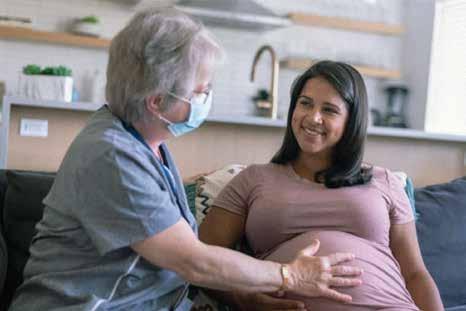
3 minute read
greater autonomy and flexibility
Self-employment is an increasingly valued choice for midwives providing care in Aotearoa. It allows midwives (together with their group practices) to provide care with autonomy and flexibility, which has a number of benefits for midwives and the māmā, pēpi and whānau they care for.
Greater autonomy leads to a greater sense of purpose for midwives. When midwives have more control over their practice, they are able to provide care in a way that is not only meaningful but also fulfilling to them (through better alignment of personal beliefs, values and sense of purpose).
It also encourages the delivery of more personalised care with midwives being able to work to the full scope of their interests and strengths. This leads to improved communication and a greater understanding of each māmā’s unique needs, ultimately leading to better health outcomes for māmā, pēpi and whānau.
Greater autonomy leads to a greater sense of purpose for midwives. When midwives have more control over their practice, they are able to provide care in a way that is not only meaningful but also fulfilling to them (through better alignment of personal beliefs, values and sense of purpose).
Greater flexibility also leads to improved access to care for māmā, as midwives can provide care in all settings (including the whānau home). This is particularly beneficial for those māmā who live in remote or under-served areas, have transportation challenges, or who may have difficulty accessing healthcare services.
Greater flexibility also allows the midwife to better balance work and life responsibilities. This is particularly important for midwives who have whānau or other caregiving responsibilities.
Self-employment with access to greater autonomy and flexibility helps to sustain the midwifery workforce in Aotearoa, by not only helping to sustain those actively working within the profession but also making midwifery a more attractive career option.
In expressing my comments, it is vital to acknowledge that community midwives who choose self-employment are not without need for equitable supports.
Locum Support For Time Off
One of the most valued workforce supports the MMPO provides is helping assure access for midwives to time off through the provision and backing of flexible on-demand locum cover. Our current response includes access to the following locum cover choices for community midwives:
• Emergency (including illness and critical events) locum cover for those working in urban, rural and remote work settings
• Non-emergency locum cover for those midwives working in rural and remote work settings only
• COVID-19 locum cover for those midwives required to self-isolate and unable to work
The intrinsic value of community midwifery locum support is significant, including being able to access as required and at short notice.
Other key benefits include:
• Assuring continuity of access to midwifery care, especially in communities where there may be a shortage of midwives
• Maintaining the highest quality of midwifery care
• Helping assure the sustainability of the community midwife with support for:
- securing their ongoing self-employed income
- valuable time off (especially in emergency situations)
All of this occurs cost effectively, mainly achieved through the framework, systems and importantly the people at the MMPO.
Over the past year we have seen the value of midwifery locum support grow significantly not only in terms of the MMPO’s delivery of existing contracts but also in the way that our service and the wider midwifery workforce has been able to assist the entire midwifery workforce. This includes support for maternity facilities challenged with staffing and providing help to those localities and regions impacted by natural disaster, as we have seen recently in the North Island.
In respect of the latter situation, we have been humbled and inspired by the positive and proactive response that was clearly evident and received from midwives even before the MMPO immediate calls for help … a perfect example of this was both the initial and ongoing team of midwives who have been relocated from around Aotearoa into Hawke’s Bay.
It is, however, vital to note that this type of response (provided in different ways) is not unexpected and is occurring regularly around our motu … something that the profession should be proud of.
RIGHT NOW…
The recent response to workforce challenges and natural disasters in Hawke’s Bay is just one example and testament to the dedication and resilience of the wider midwifery profession.
Despite these positive aspects, equal access to support and incentives must be
Obstetric and Neonatal Bed Specialists
Request a complimentary trial of one or both beds and experience first hand the difference these beds make.
provided to guarantee sustainability and equity in the sector.
The MMPO and College are always actively advocating for greater investment to support midwives in their practice and professional development, and as I write, we are again doing this important work. Our immediate focus is on enhancing access to more comprehensive time off (for midwives providing care in both urban and rural work settings) and greater support and incentive for cultural and professional development.
Greater investment will not only help assure the sustainability of the entire midwifery workforce, it will also help ensure the promotion of equity in the sector, including equal access to maternity care, time off, and more tailored support of midwives from diverse backgrounds. square www.mmpo.org.nz mmpo@mmpo.org.nz
03 377 2485
Natural birthing bed designed for improved outcomes.
Request a free trial activehealthcare.co.nz | 0800 336 339 | sales@activehealthcare.co.nz
TAWERA TRINDER (TE ATIAWA) NGĀ MAIA TRUST BOARD MEMBER, RURAL COMMUNITY MIDWIFE








